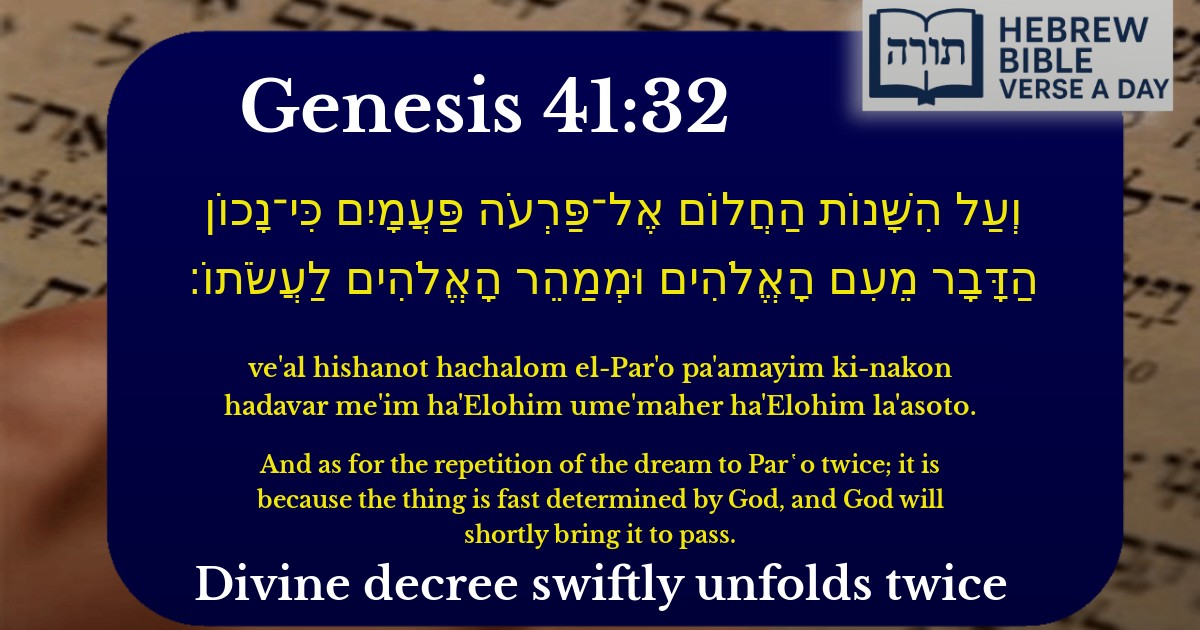Join Our Newsletter To Be Informed When New Videos Are Posted
Join the thousands of fellow Studends who rely on our videos to learn how to read the bible in Hebrew for free!
Hebrew Text
וְעַל הִשָּׁנוֹת הַחֲלוֹם אֶל־פַּרְעֹה פַּעֲמָיִם כִּי־נָכוֹן הַדָּבָר מֵעִם הָאֱלֹהִים וּמְמַהֵר הָאֱלֹהִים לַעֲשֹׂתוֹ׃
English Translation
And as for the repetition of the dream to Par῾o twice; it is because the thing is fast determined by God, and God will shortly bring it to pass.
Transliteration
Ve'al hishanot hachalom el-Par'o pa'amayim ki-nakon hadavar me'im ha'Elohim ume'maher ha'Elohim la'asoto.
Hebrew Leining Text
וְעַ֨ל הִשָּׁנ֧וֹת הַחֲל֛וֹם אֶל־פַּרְעֹ֖ה פַּעֲמָ֑יִם כִּֽי־נָכ֤וֹן הַדָּבָר֙ מֵעִ֣ם הָאֱלֹהִ֔ים וּמְמַהֵ֥ר הָאֱלֹהִ֖ים לַעֲשֹׂתֽוֹ׃
וְעַ֨ל הִשָּׁנ֧וֹת הַחֲל֛וֹם אֶל־פַּרְעֹ֖ה פַּעֲמָ֑יִם כִּֽי־נָכ֤וֹן הַדָּבָר֙ מֵעִ֣ם הָאֱלֹהִ֔ים וּמְמַהֵ֥ר הָאֱלֹהִ֖ים לַעֲשֹׂתֽוֹ׃
🎵 Listen to leining
Parasha Commentary
📚 Talmud Citations
This verse is quoted in the Talmud.
📖 Berakhot 55b
The verse is discussed in the context of dreams and their interpretations, emphasizing the certainty of divine decrees as indicated by the repetition of Pharaoh's dream.


Rashi's Explanation
Rashi (Bereshit 41:32) explains that the repetition of Pharaoh's dream signifies the certainty and imminence of its fulfillment. The doubling of the dream demonstrates that the matter is "ready" (נָכוֹן) from Hashem, meaning it is firmly decreed and will happen swiftly. Rashi further notes that this principle applies elsewhere in Tanach, such as with Yosef's own dreams, which were also doubled to indicate their inevitability.
Rambam's Perspective
In Moreh Nevuchim (2:48), Rambam discusses dreams as a form of divine communication. He explains that the repetition of Pharaoh's dream emphasizes the clarity and urgency of the message. Unlike vague or fragmented dreams, a repeated dream carries greater prophetic weight, confirming its divine origin and the certainty of its fulfillment.
Talmudic Insight
The Talmud (Berachot 55b) teaches that a dream repeated is like a letter read twice—its message is reinforced and its outcome assured. The Gemara connects this idea to our verse, stating that Hashem's decree is "fast" (וּמְמַהֵר) because divine plans, once set in motion, unfold without delay.
Midrashic Interpretation
Midrash Tanchuma (Vayeishev 4) draws a parallel between Pharaoh's doubled dream and Yosef's two dreams earlier in the parsha. Just as Yosef's dreams foretold his future leadership, Pharaoh's dreams—repeated for emphasis—confirm that the events they portend are divinely ordained and imminent. The Midrash underscores that Hashem often communicates through repetition to remove doubt.
Ibn Ezra's Commentary
Ibn Ezra (Bereshit 41:32) highlights the linguistic nuance of נָכוֹן ("fast determined"), explaining that it implies both preparedness and inevitability. The doubling of the dream is not merely for emphasis but serves as a divine seal, ensuring that the years of plenty and famine will unfold exactly as foretold.
Practical Implication
From these commentaries, we learn that repetition in divine communication serves two purposes: